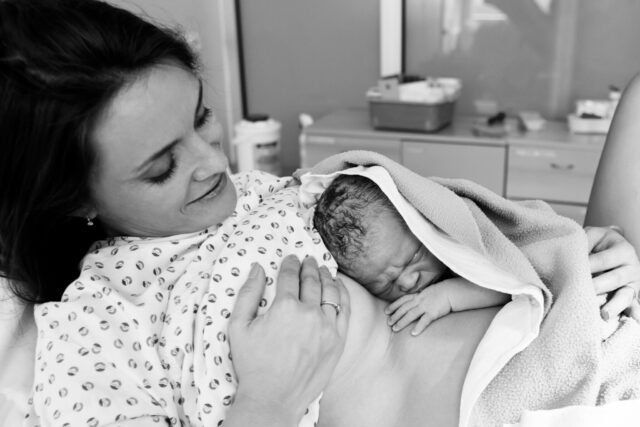Transmission Of COVID-19 During Childbirth Is Uncommon, According To New Study
It’s no secret that COVID-19 has profoundly impacted how we live our lives. From social distancing to working from home and keeping up with the ever-changing data, it’s safe to say, we’re all trying our best to stay informed and make educated decisions for ourselves and our families.
One demographic in particular who has been especially impacted by the looming uncertainty brought on by this highly-contagious pathogen is pregnant and nursing mothers.
From the World Health Organization’s adamant support for moms to continue nursing regardless of infection status, to the Centers For Disease Control’s conflicting guidelines suggesting potential mother and infant separation– there has arguably never been a more confusing or challenging time to give birth in modern history.
Thankfully, due to new and ongoing research, some good news has recently emerged from the School of Medicine at the University of Nottingham. The study, published in BJOG: An International Journal of Obstetrics and Gynaecology, was initiated to explore whether or not babies born vaginally to mothers with active COVID-19 infections were at a higher risk of infection than those born via cesarean.
The study examined data from 666 newborns birthed by 655 mothers with active COVID-19 infections. Of the 292 babies born vaginally, only 8 (2.7%) tested positive for COVID-19. Alternatively, of the 364 babies who were born via cesarean, 20 (5.3%) tested positive for the virus.
The preliminary findings of this study seem to suggest that babies born vaginally are NOT at higher risk of COVID-19 infection, as originally suspected. The study also emphasized that of those 28 infants who DID test positive for COVID-19, the infection was often mild or completely asymptomatic.
Furthermore, this groundbreaking study also invalidated the argument that babies born to COVID-19 positive mothers should be isolated and formula-fed, as expressed by Dr. Kate Walker, a Clinical Associate Professor in Obstetrics at the Univerity of Nottingham.
In a recent news release, Walker stated the following:
“We wanted to look at the outcome for babies whose mothers contracted the virus and see if the route of birth, method of infant feeding and mother/baby interaction increased the risk of babies contracting the virus. From our results, we are satisfied that the chance of newborn infection with COVID-19 is low. We would also stress that vaginal birth and breastfeeding are safe for mothers who find themselves in these circumstances.”
So if you’re a new mama or a soon-to-be mama navigating pregnancy and postpartum during these uncertain times, please rest assured knowing that no matter how you decide to deliver and feed your baby, the latest scientific findings still support your right to choose.

